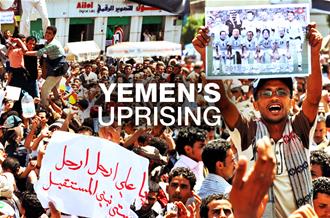President Saleh, still to sign GCC-brokered deal intended to end country's months-long crisis, warns of al-Qaeda threat.
| Yemen's opposition has signed a deal brokered by the Gulf Co-operation Council (GCC) to end the country's political crisis by easing Ali Abdullah Saleh, the president, out of power after months of unrest. The deal, signed by the opposition in the capital, Sanaa, on Saturday, commits Saleh to leaving office within 30 days in return for immunity from prosecution. It was signed in the presence of US and European Union ambassadors, said a foreign ministry official, speaking on condition of anonymity because he wasn't authorised to speak to the press. Saleh, who has backed out of the deal twice, is expected to sign on Sunday and has already called for early elections. The GCC brings together six states including Bahrain, Kuwait, Oman, Qatar, Saudi Arabia and the United Arab Emirates.
"I think this time definitely he will," she said. "There is a lot of pressure on him from the GCC, especially Saudi Arabia and also from America and the European Union." But she said the signing of the pact may not end the protests as demonstrators are not willing to leave the places they are occupying, insisting the opposition does not represent them. A spokesman for Saleh's ruling General People's Congress (GPC) said the president would sign the deal on Sunday. "The signing of the plan will be on Sunday in Sanaa," Tareq al-Shami said. "Saleh will sign the document in his capacity as president of the republic and the GPC." Al-Qaeda threat But Saleh said on Saturday that al-Qaeda could take over in many parts of the Arabian Peninsula country if he is forced out of office. "If the system falls ... al-Qaeda will capture Maarib, Hadramout, Shabwa, Abyan and al-Jouf [and] it will control the situation," Saleh said at a ceremony, listing provinces where al-Qaeda's Yemen-based wing has been active. "This is the message that I send to our friends and brothers in the United States and the European Union ... the successor will be worse than what we have currently. "We welcome the Gulf initiative and we say that we will work with it in a positive way for the sake of our homeland, (although) in reality it is a mere coup operation ... and part of foreign pressures and agendas." Saleh has survived many tussles with rivals, and skilfully used patronage and favours to keep tribal and political backers loyal. But some of his allies, including senior army officers, have abandoned him and joined the opposition as his 32-year rule appears to be entering its final days. Yemen has been reeling from months of street protests that have seen tens of thousands of people massing in Sanaa, the focal point of demonstrations. Taiz and the port city of Aden have also been scenes of mass protests. Yemen's central government was already weak before the protests began, dealing with al-Qaeda fighters in its weakly governed provinces, a rebellion in the north and a secessionist movement in the south. The United States has been propping up Saleh's government with financial aid to try to fight al-Qaeda in the Arabian Peninsula. But Barack Obama, the US president, has called on Saleh, in power since 1978, to step down. Washington and Saudi Arabia, both targets of foiled attacks by al-Qaeda's Yemen-based wing, are keen to end a stalemate that has pushed Yemen further to the brink of chaos and could give al-Qaeda more room to operate. On Saturday some 35 protesters were injured as security forces confronted protesters at the university in the Red Sea port city of Hudaida, witnesses said. Dozens were suffering from the effects of tear gas. A violent crackdown on the protests by government forces has reportedly killed more than 150 people. | ||
| Source: Al Jazeera and agencies | ||
| |


No comments:
Post a Comment